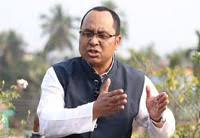Illegal immigrants from Bangladesh, Myanmar and Pakistan should be deported: Tripura minister

A minister from Tripura has stirred debate by calling for the deportation of illegal immigrants from Bangladesh, Myanmar, and Pakistan. He argued that these migrants pose a threat to national security and strain state resources. His remarks have triggered strong political and social reactions across the state.
Concerns Over Security and Demographic Balance
Addressing reporters in Agartala, the minister said illegal migration is a long-standing issue in Tripura. He stated, “People who have entered India illegally must be identified and sent back. We cannot carry the burden of outsiders who disrupt national security and demographic balance.”
Tripura shares over 850 kilometers of border with Bangladesh. This makes it a hotspot for cross-border movement. The minister believes continued illegal entry could disrupt peace and cultural harmony in local communities.
He emphasized the need to protect the rights and identity of indigenous people. “We must ensure our native population is not overpowered politically or culturally,” he said.
Appeal for Central Government Action
The minister urged the central government to tighten border security. He recommended deploying more Border Security Force (BSF) troops and installing smart fencing. “Better surveillance is key to stopping infiltration,” he added.
He also called for stronger coordination between the state and the Ministry of Home Affairs. “We need a clear national policy to detect and deport illegal immigrants,” he said.
NRC-Type Exercise in Tripura
The minister proposed a process similar to the National Register of Citizens (NRC), used in Assam. “Tripura must also verify citizenship records. Our people deserve to know who belongs and who doesn’t,” he said.
Although Assam’s NRC faced criticism, the minister argued it raised awareness about undocumented migration. He believes Tripura could benefit from a similar initiative to distinguish citizens from foreign nationals.
Opposition and Activists Respond
Opposition parties quickly condemned the minister’s statement. A senior leader said such comments deepen divides. “We should focus on unity, not target vulnerable groups,” he said.
Human rights groups also criticized the remarks. They warned that deportation without legal process could lead to humanitarian crises. “Many have lived here for decades. Deporting them is not only inhumane but legally risky,” said one activist.
Migration in Tripura: A Historical Issue
Tripura has seen large migration waves since British rule. The trend intensified during India’s partition and the 1971 Bangladesh Liberation War. Over time, this has altered the state’s demographic structure.
In some districts, the indigenous tribal population has become a minority. This shift has caused social tension and political unrest. Many tribal groups feel marginalized in their own state.
Government’s Approach to the Issue
Successive central governments have acknowledged illegal migration as a serious issue. The Ministry of Home Affairs has prioritized border fencing and immigration controls. However, enforcement remains difficult.
Deporting illegal immigrants is a complex process. It requires proof of nationality and cooperation from neighboring countries. Without these, deportation orders often remain unexecuted.
Diplomatic and Legal Challenges
Experts say deporting illegal immigrants involves legal and diplomatic hurdles. “You need evidence that the person is a national of the other country,” said a senior legal advisor. “And you need that country to accept them back.”
For example, relations with Pakistan are tense. Myanmar is facing political instability. Even with Bangladesh, repatriation talks have seen limited success.
Public Reactions in Tripura
Tripura’s people are divided on the issue. Some indigenous residents support the minister. “We feel like strangers in our own land. It’s time the government acts,” said a tribal leader.
Others oppose the call for mass deportation. “Many of these migrants are poor and helpless. They fled conflict or poverty. We must be humane,” said a school teacher in Agartala.
Conclusion
The Tripura minister’s demand to deport illegal immigrants has reignited a sensitive debate. While national security and demographic balance are important, the issue is not simple.
India must weigh human rights, legal duties, and international relations. A solution must protect citizens without harming the vulnerable. As the government considers its next steps, the nation watches closely.






